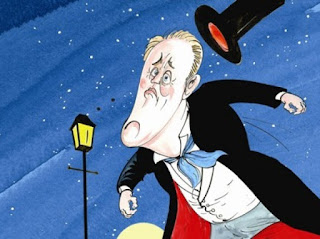But, pretty as it is, there’s something a little off-kilter about the piece and Sheader’s production never quite syncs with the stylised visuals: farce should appear liquid and effortless but the timing is often fractionally off, props are dropped and doors stick, making you all too aware of the mechanics, the creaking and squeaking of cogs and gears.
Nancy Carroll plays Agatha Posket, a widow who has shaved five years off her age in order to make herself more appealing to the upright magistrate, Aeneas (John Lithgow). To pull off this deception she was obliged to reduce the age of her young son accordingly, passing off her nineteen year old Cis as an ‘advanced’ fourteen year old. Trouble is it’s no longer possible to “pacify him with a stick and hoop” and despite his Eton jacket and short trousers he’s partial to a cigarette and a spot of Port of an evening and has all the women in his family’s employ out to pet and pander to him.
When Cis’s godfather, the bluff but decent Colonel Lukyn, threatens to pay them a visit and reveal her little deception, Agatha is forced to intercept him and ends up being caught up in a police raid and forced to appear in her husband’s court the following morning. To further complicate things Aenas – thanks to Cis - is also caught out of his element at the same hotel, obliged to flit to Kilburn in the middle of the night to avoid tangling with the law.
Lithgow is entertaining as Posket – his ordered world unravelling spectacularly over the course of a night – and, when he’s finally allowed off the leash, smudged and dishevelled and generally bested, he eats up his character’s main monologue with glee. But the production is never more alive than when Joshua MacGuire’s Cis is leap-frogging settees and dry-humping his piano mistress; a kind of matryoshka Tom Hollander with Willy Wonka hair, the production noticeably slumps whenever he is off-stage.
The issues with pacing are intensified by a series of between-scene musical interludes, in which a chorus of outsize oompa-loompas in stripy trews and matching Charles Dickens wigs sing about the perils of telling porkies. (“It’s the little lies that get you into trouble.”) But instead of acting as playful Dahl-esque winks, these are over-extended and plodding, hammering home messages that were already fully evident in the text. There are laughs, but they are very thinly spread, minor eruptions of mirth, and there’s an unresolved tonal disconnect between the cartoony design and the manner in which the piece itself plays out, an issue of identity, a gap which is never satisfyingly bridged.
When Cis’s godfather, the bluff but decent Colonel Lukyn, threatens to pay them a visit and reveal her little deception, Agatha is forced to intercept him and ends up being caught up in a police raid and forced to appear in her husband’s court the following morning. To further complicate things Aenas – thanks to Cis - is also caught out of his element at the same hotel, obliged to flit to Kilburn in the middle of the night to avoid tangling with the law.
Lithgow is entertaining as Posket – his ordered world unravelling spectacularly over the course of a night – and, when he’s finally allowed off the leash, smudged and dishevelled and generally bested, he eats up his character’s main monologue with glee. But the production is never more alive than when Joshua MacGuire’s Cis is leap-frogging settees and dry-humping his piano mistress; a kind of matryoshka Tom Hollander with Willy Wonka hair, the production noticeably slumps whenever he is off-stage.
The issues with pacing are intensified by a series of between-scene musical interludes, in which a chorus of outsize oompa-loompas in stripy trews and matching Charles Dickens wigs sing about the perils of telling porkies. (“It’s the little lies that get you into trouble.”) But instead of acting as playful Dahl-esque winks, these are over-extended and plodding, hammering home messages that were already fully evident in the text. There are laughs, but they are very thinly spread, minor eruptions of mirth, and there’s an unresolved tonal disconnect between the cartoony design and the manner in which the piece itself plays out, an issue of identity, a gap which is never satisfyingly bridged.
Reviewed for Exeunt


